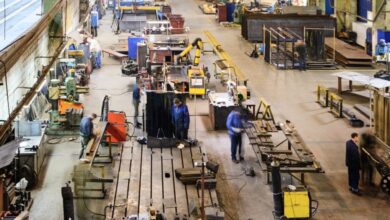
7 Ways To Improve Efficiency In Your Manufacturing Business
The fact is that all owners of a manufacturing business should be taking steps to improve efficiency because this component of growth is essential regardless of industry. Still, manufacturers should take additional steps to improve production efficiency for various reasons. These reasons span from enhancing workplace safety to lowering costs and everything in between and beyond. In addition, manufacturing companies that hold the market share are constantly looking for innovative ways to increase production efficiency to increase their profitability ultimately.
For this reason, to ensure that your manufacturing business is constantly making significant steps towards boosting production efficiency, we have put together a list of seven practical strategies for you to do so.
Determine the effectiveness of the production line
The production line of your manufacturing business is the nerve center of all of your company’s operations. Therefore, it is essential to consider all the specifics when analyzing a production line, even the frequently forgotten aspects such as the vapor blasting cabinet.
Another essential factor to consider is throughput; this statistic is required to consistently determine the average number of units produced in a given period. While high-quality equipment is vital to ensuring that your production line runs smoothly, evaluating your throughput will assist you in identifying problems in your production line when the capacity is not up to par. In addition to throughput, another aspect of your production line to examine is total output capacity. You will be able to monitor the functioning of your production line at all times in this way.
Identify and reduce waste
Creating waste in the manufacturing industry should be avoided at all costs. Waste is also used broadly in this industry and can relate to various things, including labor hours, energy consumption, and materials. Material waste is typically the most significant concern in the manufacturing industry.
When analyzing waste, keep in mind that each of your production line operations will generate some waste; identifying the procedures responsible for the majority of the waste is the most effective method of reducing overall waste generation. Instead of discarding rubbish, you can reduce waste by recycling or reusing it instead of throwing it away. It is also possible to consider selling your junk to a company that may put it to good use if you cannot eradicate the majority of your waste.
Identify the sources of your breakdowns
When reviewing your production line, you will certainly identify the most critical breaks in the manufacturing process, which we often call bottlenecks. It is vital for a manufacturing business to identify the sources of breakdowns and take steps to prevent them from reoccurring. This is because even an hour or two of operations being shut down can have a significant impact on your company’s reputation as well as its overall profits.
Increase the effectiveness of training practices
There is no doubting that your staff is the glue that holds your manufacturing business together, which holds for businesses of all sizes and industries. However, suppose your employees have not been appropriately trained. In that case, Their ability to handle their work roles properly will be hampered, and their efficiency will be reduced to the greatest extent feasible in this situation. Furthermore, if your personnel does not receive continued training to improve their abilities constantly, your production efficiency will most likely stagnate.
Increased training procedures are therefore essential for increasing the efficiency of manufacturing. It would help if you also considered health and safety training and other relevant training methods because the more tools you provide your staff, the more capable they will be.
Workplace quantification and organization
It is possible to increase production efficiency if your personnel can carry out their jobs in an organized workplace. As a result, it is essential to quantify and manage the workplace. First, it is vital to quantify each element of your business, as this will provide you with a clear perspective into what is working and what is not working in your industry. You will then need to organize everything in the workplace to ensure that your staff can perform their jobs effectively and efficiently.
Ensure you have the right suppliers
The appropriate suppliers are always critical to your company’s success because you rely on them to provide you with the quality and quantity of supplies that you require to fulfill deadlines and execute customer orders on time. Because of this, you should ensure that you can locate a trustworthy provider, which you can do by asking for suggestions from other business owners.
Keep on top of maintenance
Equipment and machinery repairs might put you days behind schedule, particularly if you have to shut down your production while resolving the problem. As a result, you should ensure that you are continually working to inspect and repair your equipment in a manufacturing business. This can prevent it from breaking down entirely in the future and ensure that any wear and tear is discovered as soon as possible.
Talk to your employees if you are experiencing downtime in your process; look to your staff for ideas. It stands to reason that the person in charge of carrying out a job could have some suggestions for making the process more efficient. On the other hand, executives and managerial personnel, who are accustomed to looking at the large picture, can easily overlook modest opportunities for change. Open lines of communication allow employees to efficiently communicate up the chain anytime they have recommendations, opinions, or concerns by enabling them to express themselves.






